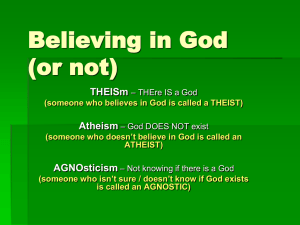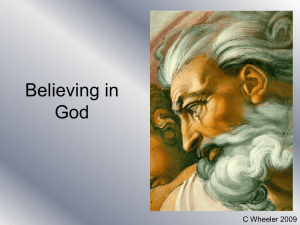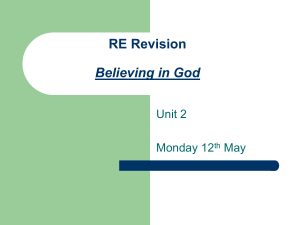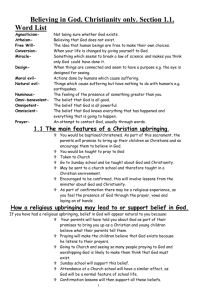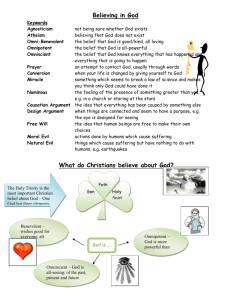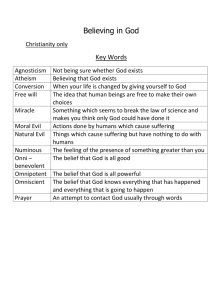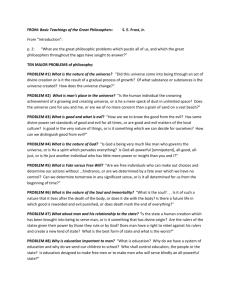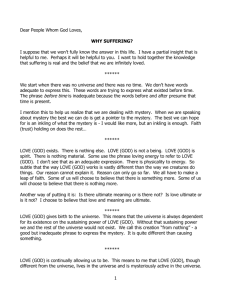`Believing in God` revision cards - Trinity Church of England High
advertisement
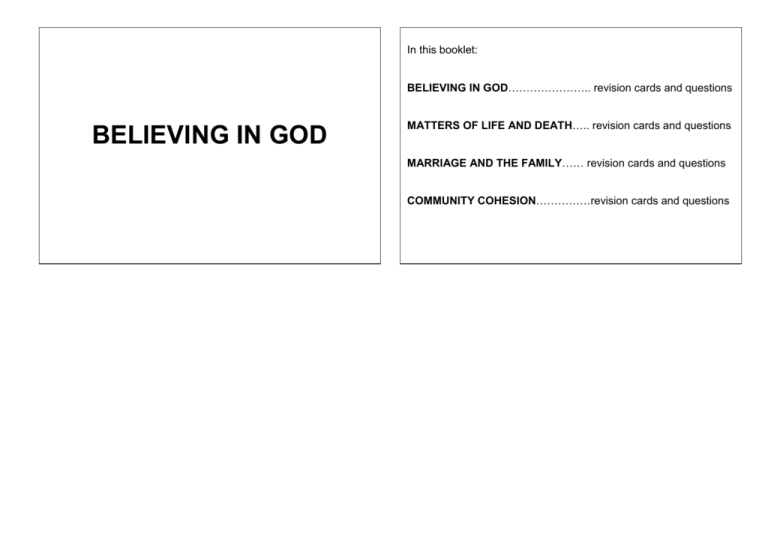
In this booklet: BELIEVING IN GOD………………….. revision cards and questions BELIEVING IN GOD MATTERS OF LIFE AND DEATH….. revision cards and questions MARRIAGE AND THE FAMILY…… revision cards and questions COMMUNITY COHESION……………revision cards and questions BELIEVING IN GOD 1 – Key Words Agnosticism – not being sure whether God exists. Atheism – believing that God does not exist. Conversion – when your life is changed by giving yourself to God. Free Will – The idea that human beings are free to make their own choices. Miracles – something that seems to break a law of science and makes you think only God could have done it. Moral evil – actions done by humans that cause suffering. Natural evil – things like earthquakes and floods that cause suffering and have nothing to do with humans. Numinous – the feeling of the presences of something much greater than you. Omni - benevolent – the belief that God is good/loving. Omnipotent – the belief that God is all-powerful/ can do anything. Omniscient – the belief that God knows everything that has happened and that is going to happen. Prayer – an attempt to contact God, usually through words. BELIEVING IN GOD 3 – RELIGIOUS EXPERIENCE AND BELIEF IN GOD Religious experience means the ways in which people feel they come into direct contact with God. This can include: The numinous – that feeling you get when you look up at the stars or say your prayers and feel in the presence of something much greater than you; Conversion – an experience that changes your life and makes you more religious (e.g. Nicky Cruz or St Paul on the road to Damascus); Miracles – e.g. when someone is cured from an incurable disease after prayers have been said for them; Answered prayers – e.g. when someone prays for God to help them out of a problem and the problem disappears. Any of these experiences are almost certain to lead the person who experiences them to believe in God. BELIEVING IN GOD 2 – RELIGIOUS UPBRINGING AND BELIEF IN GOD If a child is brought up by Christian parents, then they will believe in God from the beginning of their life. They will be taken to church to worship God with their parents; They will be taught to pray to God; They will be baptised or dedicated to God; They will be expected to thank God and celebrate religious festivals, such as Christmas and Easter; They may go to a school where everyone believes in God and so they are expected to believe in God. All these things would encourage and support belief in God. Why would you doubt God if you had always been brought up to believe and everyone around you believes? BELIEVING IN GOD 4 Design and belief in God This argument was put forward by William Paley It says that just as a watch has a designer, the universe ‘must also have a designer.’ Some people think the way the world works shows that God must exist: The universe seems to be designed because of: The way the universe works according to scientific laws such as gravity The way humans grow from a tiny blueprint of DNA The way complex mechanisms work such as the eye allowing people to see The way the Big Bang worked with the laws of science to produce a universe of order This leads people to believe in God because: If something is designed it must have a designer The universe is designed The only possible designer of the universe is God Therefore people believe God must exist BELIEVING IN GOD 9 – Reasons why unanswered prayers may lead to agnosticism or atheism. BELIEVING IN GOD 10 – EVIL AND SUFFERING Evil and suffering takes two forms: 1. If people pray to God but do not feel his presence when they are praying they may feel that no-one is listening and become either an agnostic or an atheist. 2. If people pray to God and their prayers are not answered they will find it very difficult to believe in God e.g. if parents prayed for their child to be cured of cancer but the child still died then they might think God does not exist. What would a Christian say to this? Most Christians believe that God answers all prayers but not always in the way someone would expect: If you pray for selfish things then God will not help you. Your prayer may not seem to be answered because God has a different plan for you e.g. he may want an ill person to enter heaven God may answer prayers by giving people what they need not what they want. Moral Evil – actions done by humans which cause suffering e.g. murder. Natural Evil – suffering that has NOT been caused by humans e.g. Earthquakes How evil and suffering cause people to question belief in God: Some people do not believe in God because they think that there would be no suffering in a world created by a good and powerful God. Religious believers find the existence of evil and suffering a problem because: If God is all good (omni-benevolent) he ought not to want evil and suffering in the world; If God is all powerful (omnipotent) he should be able to get rid of evil and suffering from the world he created; If God is all knowing (omniscient) he must have known that evil and suffering would come into the Universe and should have created it differently. BUT, there is evil and suffering in the world and so either God is not all good, all powerful or all knowing, or God does not exist BELIEVING IN GOD 11 – Christian responses to evil and suffering Response One Christians should follow the example of Jesus by helping those who suffer through: PRAYER – asking God to help those who suffer (intercession); SERVICE (actively helping those who suffer) – many organise food and clothing for the homeless, raise money for those in less developed countries, help in hospitals, etc. Response Two Some Christians think that by giving humans free will God created a world in which evil and suffering can happen. Evil and suffering are caused by humans not God. Response Three Other Christians think that life is a sort of test in which people prepare their souls for heaven. Evil and suffering need to be faced for people to become good, kind and loving. God will reward them in heaven. Response Four Other Christians think that God has a reason in allowing suffering to happen but humans cannot understand it. BELIEVING IN GOD 12 – How can Songs of Praise affect a person’s attitude to God? Songs of Praise Some people might have their belief in God strengthened by watching Songs of Praise because: They were convinced by the way religious believers eg Rhydian, talk about experiencing God. Listening and singing along to the hymns and prayers could make people feel closer to God in their homes and more likely to believe in God. The programme made religion look real and interesting and showed how it affected people’s daily lives. Some people might not agree and think that Songs of Praise would not make someone believe in God because: Religious programmes are boring and not enough people watch them. It is just talking about religion and not about God’s existence. BELIEVING IN GOD 5: How the appearance of design may not lead to belief in God Many people think the design argument does not lead to belief in God because: There is evidence in the Universe that it has not been designed e.g. volcanoes, earthquakes, hurricanes, diseases Science can explain why the earth appears designed without God What about dinosaurs? No one thinks they could have been part of the design plan The design argument only proves that the universe has a designer – not that the designer is God. The designer could be many Gods or an evil God. BELIEVING IN GOD 6: The Causation Argument and Belief in God This argument was put forward by Thomas Aquinas. Causation is the idea that if something happens something must have caused it to happen. This can lead people to believe in God because: If we look at things in the world we can see they have a cause Anything caused to exist must be caused by something else Therefore the universe itself must have a cause Only God could be the cause of the universe Therefore god must exist BUT some people disagree with this argument because: If everything must need a cause then God must need a cause as well. Matter is eternal and cannot be changed or created so there is no first cause. Even if there is a first cause it doesn’t mean that the first cause is God, it could be any sort of creator. BELIEVING IN GOD 7: Scientific Explanations of the world Science explains the world this way: Matter is eternal and cannot be created or destroyed. The universe began about 15 billion years ago when this matter exploded. The solar system formed from this matter about 5 billion years ago. Primitive life forms formed and began to develop through evolution. Then about 2.5 million years ago humans evolved. This scientific explanation may lead to agnosticism or atheism because: Science can explain where the world came from without any reference to God. This can lead some people to be unsure whether God exists (agnostics) or to be sure that there is no God (atheists) BELIEVING IN GOD 8: How Christianity Responds to the Scientific Argument Response 1 Many Christians accept the scientific explanations are true and prove that God created the universe because: Only God could have made the Big Bang at exactly the right microsecond Only God could have made laws like Gravity Only God could have made gases become life Response 2 (Creationists) Some Christians believe that all the scientific evidence is wrong, the Biblical story of creation is absolute fact, they believe in: The effects of Noah’s flood – this caused so much damage that it aged the world The Apparent Age Theory – the idea that God made the world to look older than it is Response 3 Some Christians believe both science and the Bible are true because: One of God’s days could be billions of years When God said ‘Let there be light’ ,it was a direct reference to the big bang. BELIEVING IN GOD 13 – How can The Miracle of Peckham affect a person’s attitude to God? Miracle of Peckham Some people might have their belief in God strengthened by watching Miracle of Peckham because: They are convinced that the miracle that happened in the Church could really happen. It makes them more likely to believe in miracles. The character of the vicar shows them how a good Christian would act. The programme made religion look interesting and fun and showed how it can affect people’s daily lives. Some people might not agree and think that The Miracle of Peckham would make someone not believe in God because: The miracle was faked and the programme shows that miracles don’t really happen. Delboy and Rodney were not really interested in religion, they just wanted to make money so are not a good example. The programme just encouraged people to not believe in God, as it made a joke out of religion.
